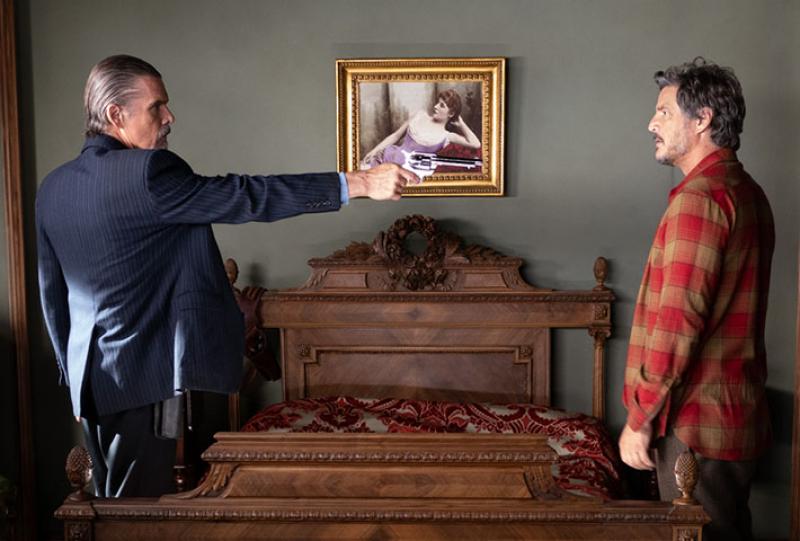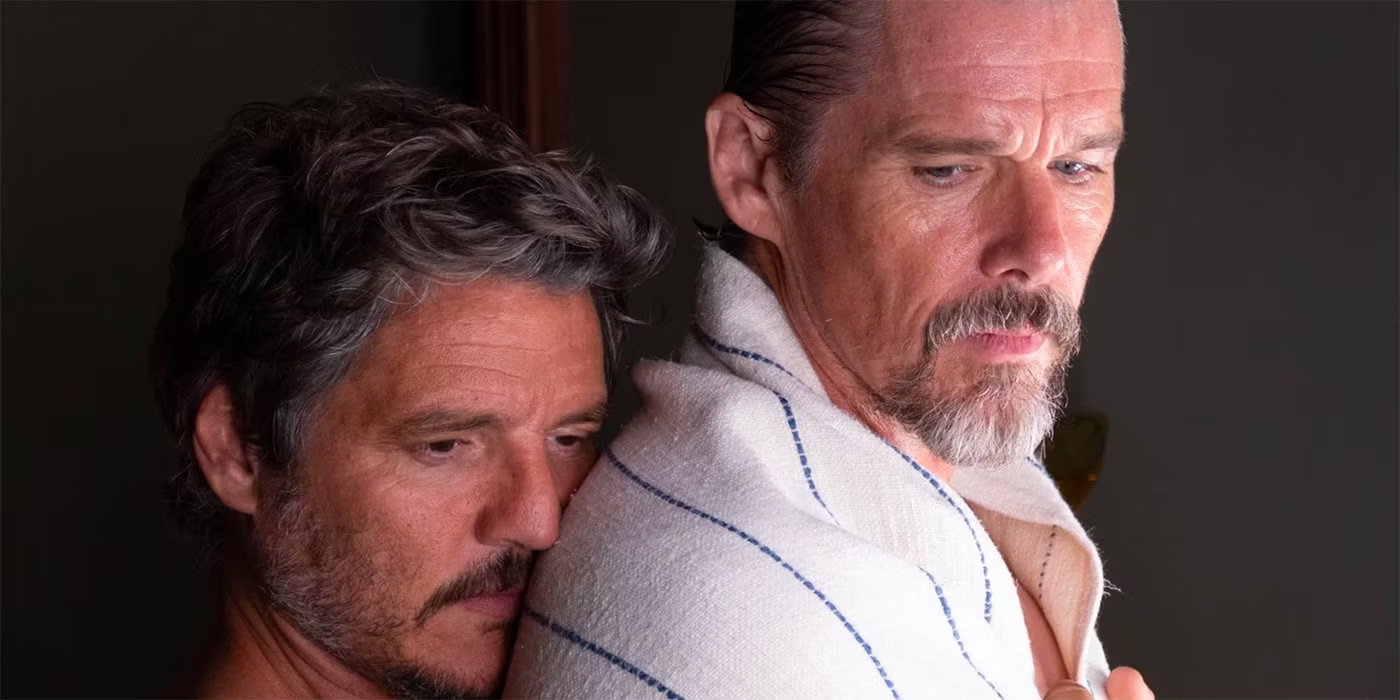Strange Way of Life review - Pedro Almodóvar's queer Western | reviews, news & interviews
Strange Way of Life review - Pedro Almodóvar's queer Western
Strange Way of Life review - Pedro Almodóvar's queer Western
A sheriff and his old lover spark again in a thin frontier drama

Less is more, except when it isn’t. Among the latest batch of overlong Oscar-tipped movies by celebrated auteurs such as Christopher Nolan (Oppenheimer with a running time of 181 minutes) and Martin Scorsese (Killers of the Flower Moon, 207 mins), it’s a relief to find the iconic Spanish filmmaker Pedro Almodóvar bucking the trend with a 31-minute short that doesn’t test the audience’s mental and physical stamina.
His second English-language movie is visually more ambitious than its predecessor, The Human Voice (2020), a short monologue adapted from Jean Cocteau and starring Tilda Swinton. Strange Way to Live is a queer Western made with the director’s signature style and colourful palette, but also with a surprising reverence for the beloved tropes of classic American horse operas. So we get the lone cowboy riding into a town aptly named Bitter Creek, we get a grizzled sheriff, we even get a fistfight in the dust, and a gunfight in the corral. (In fact the movie was shot on the very same sets in the Almería desert of southern Spain where Sergio Leone shot his trilogy of Spaghetti Westerns starring Clint Eastwood.)
Ironically, what we don’t get in Strange Way of Life is quite enough strangeness or a feeling that the movie has turned a genre inside out in Almodóvar’s unique way. Co-produced by his own El Deseo company and Saint Laurent, whose head designer Anthony Vaccarello also served as the film's costume designer, everything looks so lovely – the velvet bedspreads, the cowboy’s lime-green jacket, the wallpaper – and is about as subversive as a luxury fashion brand commercial.
The plot is more of a pastiche than a genre-bender. The stranger riding into town is Silva (Pedro Pascal, star of The Mandalorian and The Last of Us) who’s come to Bitter Creek in search of its gravel-voiced lawman Jake (Ethan Hawke), with whom he had a torrid love affair a quarter of a century ago. “I came here because I wanted to see you again. I’ve wanted to see you for a long time,” says Silva. “Bullshit!” replies the ex-lover, who suspects that Silva’s only shown up to protect his outlaw son (George Steane), a prime suspect in the murder of Jake’s sister-in-law.
 The sex spark between the two men reignites over dinner and quite a few drinks. “You look impressive dressed as a sheriff,” says Silva to Jake in his sleek designer outfit, to which Jake replies, “I’m not just dressed as a sheriff. I am a sheriff!” Pretty soon, they’re thrashing away under Jake’s sumptuous bedspread. The next morning, still in a post-coital glow, Silva asks Jake, “Can I borrow a pair of your underpants?”, which isn’t a line I can remember hearing in any John Ford movie. Nevertheless it gives Almodóvar his cue for a lovingly protracted shot of the Sheriff’’s pristine underwear drawer.
The sex spark between the two men reignites over dinner and quite a few drinks. “You look impressive dressed as a sheriff,” says Silva to Jake in his sleek designer outfit, to which Jake replies, “I’m not just dressed as a sheriff. I am a sheriff!” Pretty soon, they’re thrashing away under Jake’s sumptuous bedspread. The next morning, still in a post-coital glow, Silva asks Jake, “Can I borrow a pair of your underpants?”, which isn’t a line I can remember hearing in any John Ford movie. Nevertheless it gives Almodóvar his cue for a lovingly protracted shot of the Sheriff’’s pristine underwear drawer.
The obvious precursor to Strange Way of Life is Brokeback Mountain (2005), and in fact Almodóvar turned down the opportunity to film that Annie Proulx story about cowboys finding solace in each other’s arms. At one point Silva even quotes the Heath Ledger character in Ang Lee’s film: “Years ago you asked me what two men could do living together on a ranch.” But there are other more recent films, such as The Rider (2017), First Cow (2019), and The Power of the Dog (2021), significantly all made by female directors (Chloé Zhao, Kelly Reichardt and Jane Campion respectively), in which latent homosexuality plays a part.
Yet the history of the queer Western can also be traced back to the innuendo of Howard Hawks’s Red River, to Sam Peckinpah’s Ride the High Country or even his Pat Garrett and Billy the Kid. Cowboys often live in homosocial groups so it doesn’t take much for the sex dynamics to be teased out. The Western is a male genre, full of anxieties about masculinity, as Almodóvar himself points out in a recorded Q&A screened at the end of Strange Way of Life.
In terms of length, the new film resembles The Human Voice, but its plot has more in common with Almodóvar’s 2019 feature, Pain and Glory, in which the spark between two former male lovers is rekindled after decades. Perhaps a director celebrated for his female characters in films such as All About My Mother, Volver, and Women on the Verge of a Nervous Breakdown is now shifting his attention to the opposite sex.
Strange Way of Life is a minor work by a master filmmaker because unlike its lush orchestral score by Alberto Iglesias, the dramatic content of the movie feels a bit thin. On the other hand, Almodóvar serves up half an hour of fetishistic fun and at least provides the beginnings of an answer to Heath Ledger’s question.
The future of Arts Journalism
You can stop theartsdesk.com closing!
We urgently need financing to survive. Our fundraising drive has thus far raised £49,000 but we need to reach £100,000 or we will be forced to close. Please contribute here: https://gofund.me/c3f6033d
And if you can forward this information to anyone who might assist, we’d be grateful.

Subscribe to theartsdesk.com
Thank you for continuing to read our work on theartsdesk.com. For unlimited access to every article in its entirety, including our archive of more than 15,000 pieces, we're asking for £5 per month or £40 per year. We feel it's a very good deal, and hope you do too.
To take a subscription now simply click here.
And if you're looking for that extra gift for a friend or family member, why not treat them to a theartsdesk.com gift subscription?
more Film
 Bugonia review - Yorgos Lanthimos on aliens, bees and conspiracy theories
Emma Stone and Jesse Plemons excel in a marvellously deranged black comedy
Bugonia review - Yorgos Lanthimos on aliens, bees and conspiracy theories
Emma Stone and Jesse Plemons excel in a marvellously deranged black comedy
 theartsdesk Q&A: director Kelly Reichardt on 'The Mastermind' and reliving the 1970s
The independent filmmaker discusses her intimate heist movie
theartsdesk Q&A: director Kelly Reichardt on 'The Mastermind' and reliving the 1970s
The independent filmmaker discusses her intimate heist movie
 Blu-ray: Wendy and Lucy
Down-and-out in rural Oregon: Kelly Reichardt's third feature packs a huge punch
Blu-ray: Wendy and Lucy
Down-and-out in rural Oregon: Kelly Reichardt's third feature packs a huge punch
 The Mastermind review - another slim but nourishing slice of Americana from Kelly Reichardt
Josh O'Connor is perfect casting as a cocky middle-class American adrift in the 1970s
The Mastermind review - another slim but nourishing slice of Americana from Kelly Reichardt
Josh O'Connor is perfect casting as a cocky middle-class American adrift in the 1970s
 Springsteen: Deliver Me From Nowhere review - the story of the Boss who isn't boss of his own head
A brooding trip on the Bruce Springsteen highway of hard knocks
Springsteen: Deliver Me From Nowhere review - the story of the Boss who isn't boss of his own head
A brooding trip on the Bruce Springsteen highway of hard knocks
 The Perfect Neighbor, Netflix review - Florida found-footage documentary is a harrowing watch
Sundance winner chronicles a death that should have been prevented
The Perfect Neighbor, Netflix review - Florida found-footage documentary is a harrowing watch
Sundance winner chronicles a death that should have been prevented
 Blu-ray: Le Quai des Brumes
Love twinkles in the gloom of Marcel Carné’s fogbound French poetic realist classic
Blu-ray: Le Quai des Brumes
Love twinkles in the gloom of Marcel Carné’s fogbound French poetic realist classic
 Frankenstein review - the Prometheus of the charnel house
Guillermo del Toro is fitfully inspired, but often lost in long-held ambitions
Frankenstein review - the Prometheus of the charnel house
Guillermo del Toro is fitfully inspired, but often lost in long-held ambitions
 London Film Festival 2025 - a Korean masterclass in black comedy and a Camus classic effectively realised
New films from Park Chan-wook, Gianfranco Rosi, François Ozon, Ildikó Enyedi and more
London Film Festival 2025 - a Korean masterclass in black comedy and a Camus classic effectively realised
New films from Park Chan-wook, Gianfranco Rosi, François Ozon, Ildikó Enyedi and more
 After the Hunt review - muddled #MeToo provocation
Julia Roberts excels despite misfiring drama
After the Hunt review - muddled #MeToo provocation
Julia Roberts excels despite misfiring drama
 Ballad of a Small Player review - Colin Farrell's all in as a gambler down on his luck
Conclave director Edward Berger swaps the Vatican for Asia's sin city
Ballad of a Small Player review - Colin Farrell's all in as a gambler down on his luck
Conclave director Edward Berger swaps the Vatican for Asia's sin city
 London Film Festival 2025 - Bradley Cooper channels John Bishop, the Boss goes to Nebraska, and a French pandemic
... not to mention Kristen Stewart's directing debut and a punchy prison drama
London Film Festival 2025 - Bradley Cooper channels John Bishop, the Boss goes to Nebraska, and a French pandemic
... not to mention Kristen Stewart's directing debut and a punchy prison drama

Add comment